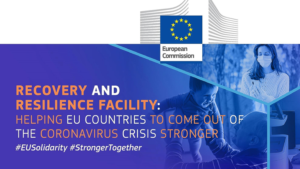 The Recovery and Resilience Facility (RRF) was established in 2021 to mitigate the economic and social impact of the COVID-19 pandemic. To receive a share of the more than €700 billion in EU financial support available under the RRF, Member States have to submit national recovery and resilience plans, which are examined by the European Commission. According to a special report published today by the European Court of Auditors (ECA), the Commission’s assessment is generally appropriate, but there remain risks to the successful implementation of the national recovery and resilience plans, such as unclear milestones and targets.
The Recovery and Resilience Facility (RRF) was established in 2021 to mitigate the economic and social impact of the COVID-19 pandemic. To receive a share of the more than €700 billion in EU financial support available under the RRF, Member States have to submit national recovery and resilience plans, which are examined by the European Commission. According to a special report published today by the European Court of Auditors (ECA), the Commission’s assessment is generally appropriate, but there remain risks to the successful implementation of the national recovery and resilience plans, such as unclear milestones and targets.
“The Recovery and Resilience Facility is a unique instrument aimed at supporting Member States’ reforms and investments and thus their recovery and resilience”, said Ivana Maletić, the ECA member who led the audit. “The timely availability of support plays a key role, but not at the cost of sound financial management. Full transparency and effective controls must be in place to ensure that EU funds are used for their intended purpose and achieve their envisaged impact.”
The auditors examined the Commission’s process for assessing the national recovery and resilience plans and the guidance provided to Member States in this context. For six Member States (Germany, Greece, Spain, France, Croatia and Italy) the auditors also verified whether the Commission’s assessment ensured compliance with the conditions of the Recovery and Resilience Facility.
They found that, generally, the assessment was appropriate. The Commission based its evaluations on comprehensive internal guidelines and checklists. However, the assessors did not use those systematically or uniformly for the qualitative assessment, and this sometimes made the assessment difficult to trace.
According to the auditors, the recovery and resilience plans are likely to contribute to the policy areas relevant to the RRF, but the extent of their contribution varies, and its impact remains to be seen in practice. Similarly to the conclusion the Commission reached in its own assessment, the auditors found that none of the measures in the audit sample are likely to do significant harm to the environment. However, measures to mitigate environmental impacts have not been systematically included in the form of milestones or targets in the recovery and resilience plans.
The Commission’s assessment improved the quality of milestones and targets, the auditors found. Nevertheless, some of them lacked clarity and did not cover key stages of implementation, and a harmonised approach was not always applied across Member States. The Commission’s assessment of the estimated costs reflected a lack of information for certain measures. It also reflected the fact that the disbursement profiles were a result of negotiations rather than a reflection of the underlying costs.
In addition to this, the auditors examined whether the Commission’s assessment ensured that the recovery and resilience plans addressed all or a significant subset of the country-specific recommendations made in the context of the European Semester – the EU’s cycle of economic, fiscal, labour and social policy coordination. The auditors noted that the assessment of what constitutes a “significant subset” of country-specific recommendations is not defined, and therefore remains to some extent judgemental, especially in cases where the Commission identified gaps. The auditors also found that some elements of the country-specific recommendations remained unaddressed across the Member States in the audit sample.
Background information
In July 2020 the European Council agreed a more than €800 billion recovery fund – NextGenerationEU. Its centrepiece is the Recovery and Resilience Facility, amounting to up to €723.8 billion (in current prices) in total. This audit is the first in a series on the Recovery and Resilience Facility, one of the ECA’s priorities to address the EU’s response to the COVID-19 pandemic across various policy dimensions, including economic governance.
Special report 21/2022, “The Commission’s assessment of national recovery and resilience plans: overall appropriate but implementation risks remain”, is available on the ECA website.